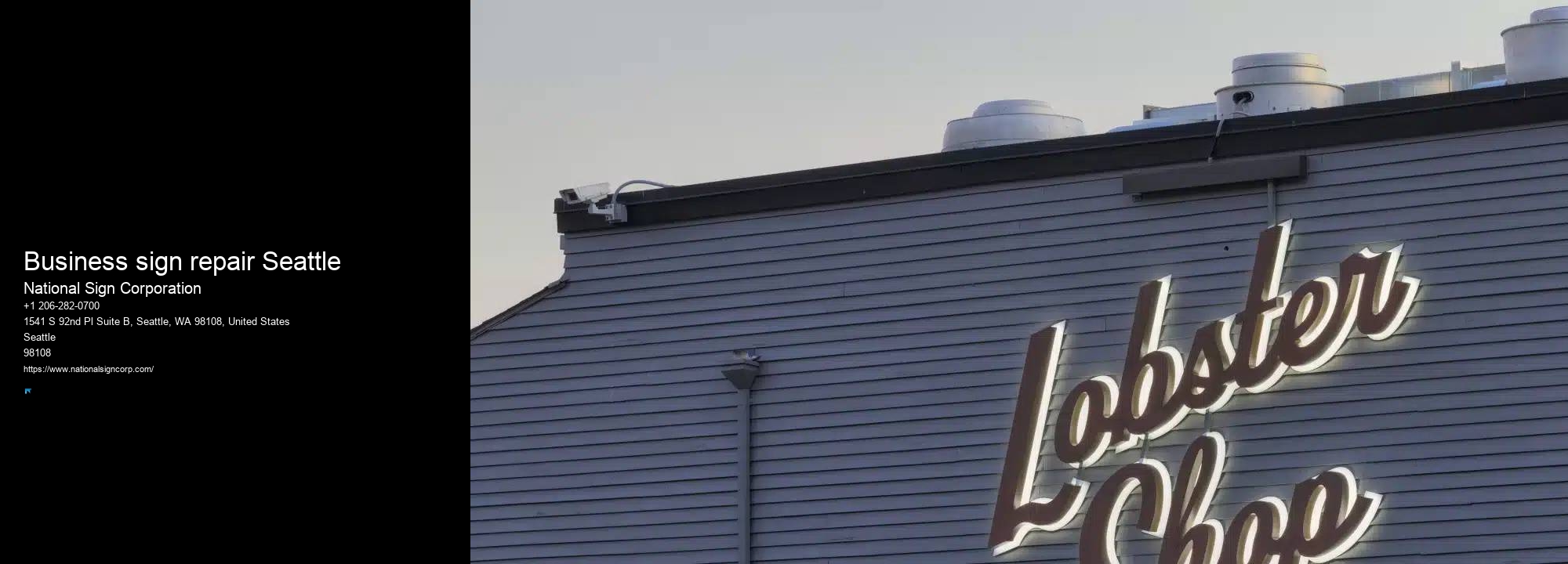

In the heart of Business sign repair Seattle, where innovation meets aesthetics, the National Sign Corporation stands as a beacon of creativity in the realm of signage solutions. Learn more about National Sign Corporation here. They understand that sustainability is as important to you as it's to them. In the bustling marketplace of Business sign repair Seattle, letting your business shine brighter than the rest isn't just a matter of chance; it's about making strategic choices that illuminate your brand's unique value. Learn more about Business sign repair Seattle here At National Sign Corporation, we're committed to not just meeting your signage needs but doing so in a way that's kinder to our planet.
You're not just getting a sign; you're getting a tailor-made solution that understands and amplifies your unique brand voice. They understand the importance of first impressions and ensure your electronic messaging sign makes the right one every time.
This journey begins with a deep dive into your brand's identity, goals, and the message you wish to convey. Imagine your sign illuminated by eco-friendly LED lights, or crafted from reclaimed wood for a rustic, yet modern appeal. Throughout this process, our goal is to make it seamless and stress-free for you, turning your vision into reality with precision and creativity. It's their commitment to innovation. This isn't about sticking to the basics; it's about breaking the mold.
By doing so, we aim to reinforce Business sign repair Seattle's identity on the national stage as a hub of innovation, creativity, and community. What's more, they handle all the heavy lifting. You'll find examples of custom digital displays that have transformed retail spaces into interactive environments, drawing customers in and boosting sales.
The Seattle area has been inhabited by Native Americans (such as the Duwamish, who had at least 17 villages around Elliot Bay) for at least 4,000 years before the first permanent European settlers. Arthur A. Denny and his group of travelers, subsequently known as the Denny Party, arrived from Illinois via Portland, Oregon, on the schooner Exact at Alki Point on November 13, 1851. The settlement was moved to the eastern shore of Elliott Bay in 1852 and named "Seattle" in honor of Chief Seattle, a prominent 19th-century leader of the local Duwamish and Suquamish tribes. Seattle currently has high populations of Native Americans alongside Americans with strong Asian, African, European, and Scandinavian ancestry, and, as of 2015, hosts the fifth-largest LGBT community in the U.S.
Let's help you make a statement that leaves a lasting impression on your audience, elevating your brand above the competition. You can rest easy knowing your sign will always look its best and function perfectly, reflecting the quality and professionalism of your business. Whether it's regular cleaning, electrical checks, or updates, we're on it. National Sign Corporation uses top-grade materials, ensuring that your signage retains its vibrant colors and structural integrity over the years.
Hearing from those who've experienced National Sign Corporation's impact firsthand, numerous clients share their success stories, highlighting the transformative power of expertly crafted signage on their business. You can customize your message, flash sales, or special events in real-time, captivating potential customers with dynamic displays. Lastly, personalization is key.
From the intricacies of interior signage options to the bold statements made by exterior signage varieties, the durability and quality of their offerings are unmatched.
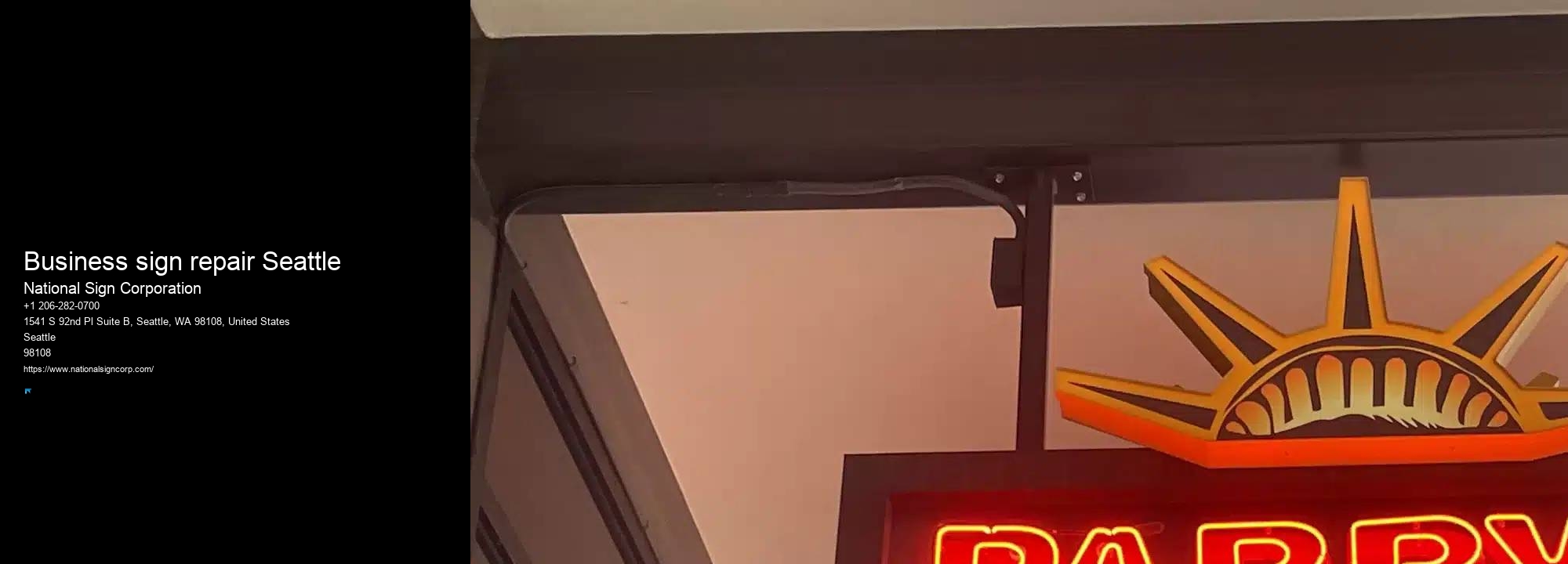
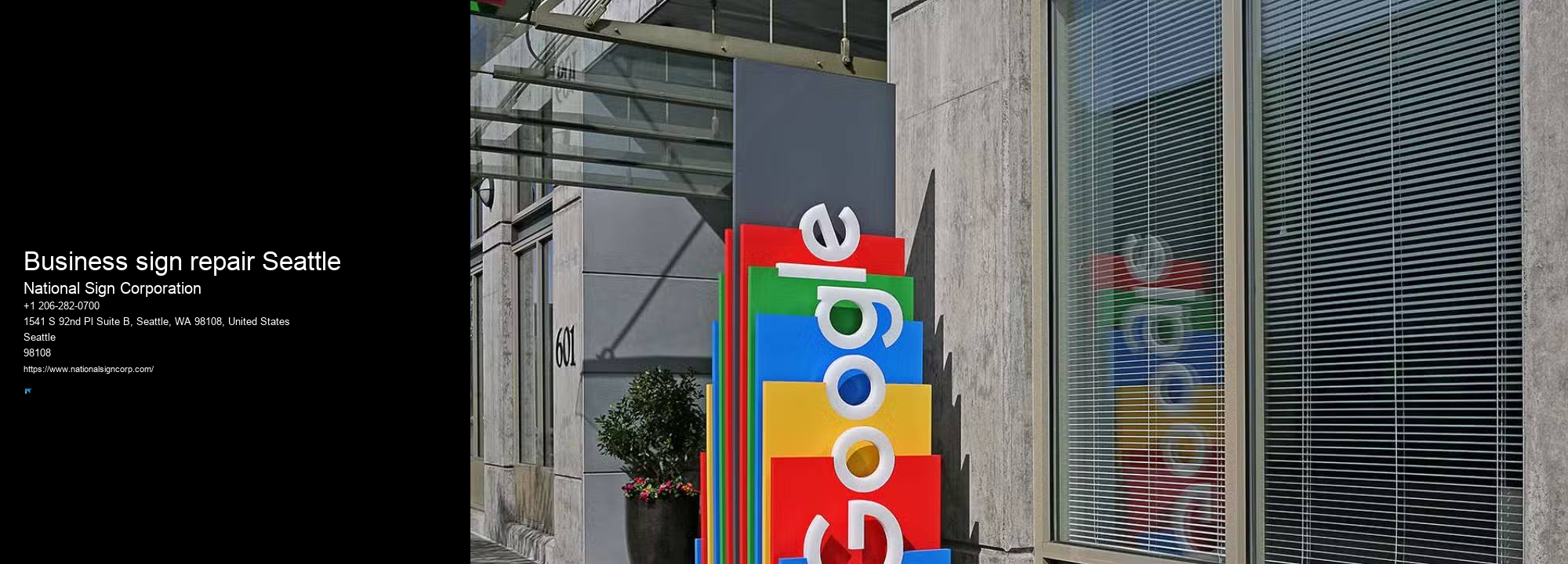
It's their commitment to customer service. Building on our expertise in installation and maintenance, we've seen remarkable success stories emerge right here in Business sign repair Seattle. We're here to ensure that we're doing our part for the environment, making sustainability a cornerstone of how we operate. These aren't your run-of-the-mill signs. Next, reach out to their expert team through the contact form or by giving them a call.
From towering outdoor billboards that capture the city's skyline to elegant indoor signage that enhances brand identity, we've done it all. We pride ourselves on using only the highest quality materials and the latest technology to bring your design to life. Like LED signs, RGB lights consume less power than traditional lighting options, leading to lower energy costs for your business.
As we unpack the layers behind these electronic marvels, you'll discover the intricate balance between sustainability, technological advancements, and impactful design that National Sign Corporation navigates to bring their clients' visions to life. They don't just make signs; they create visual landmarks that embody a brand's identity and message. Their process begins with a deep understanding of your vision. These aren't distant dreams; they're the next steps in signage technology.
When you're navigating the bustling streets of Business sign repair Seattle, it's your unique signage that captures attention and draws potential customers into your business space. Our portfolio features a wide array of custom signs, showcasing our commitment to quality and client satisfaction. Building on their technological prowess, National Sign Corporation boasts an impressive portfolio that showcases a wide range of custom signage solutions tailored for various business needs.
You're seeking a sign that stands out, right?
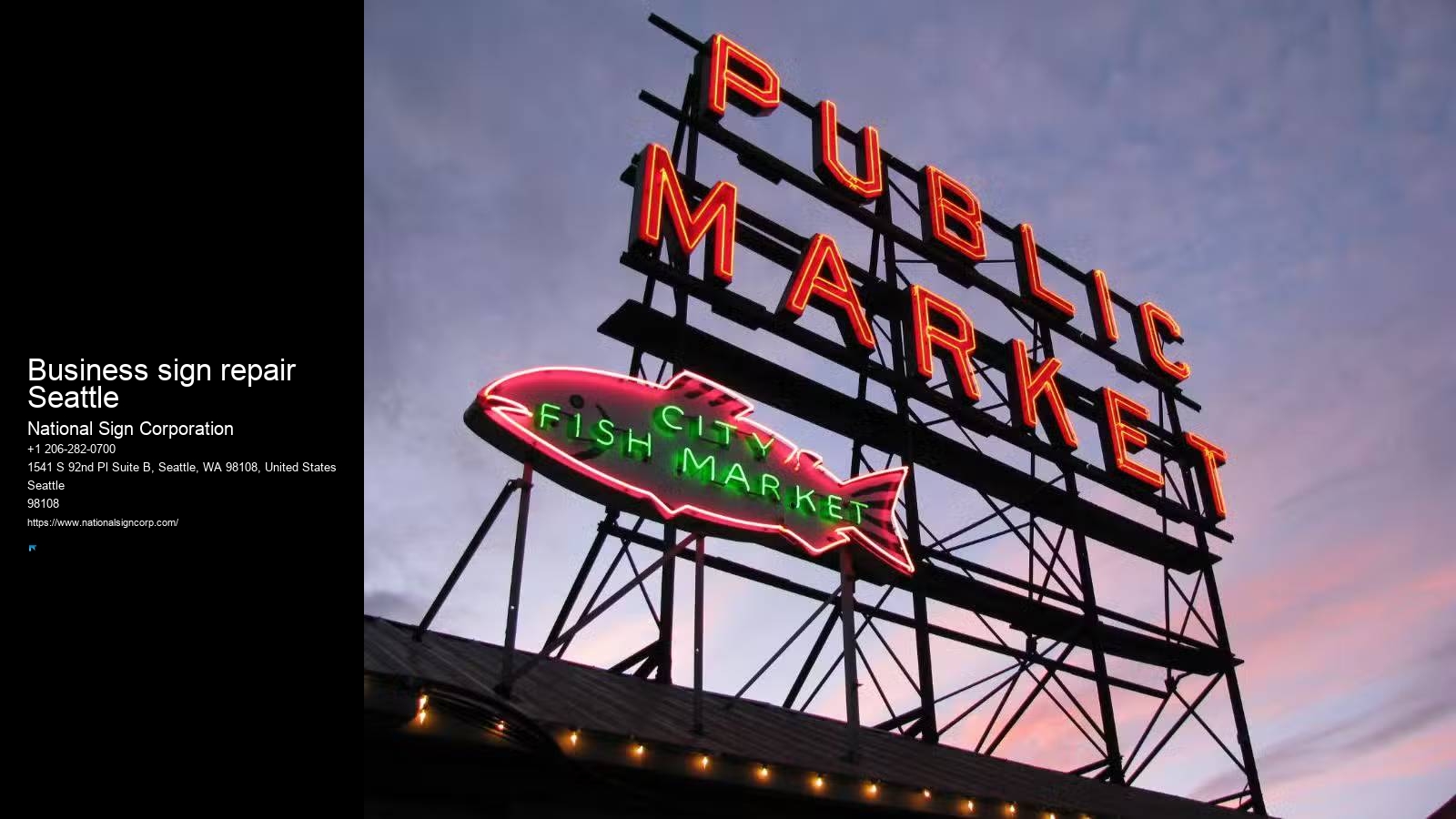
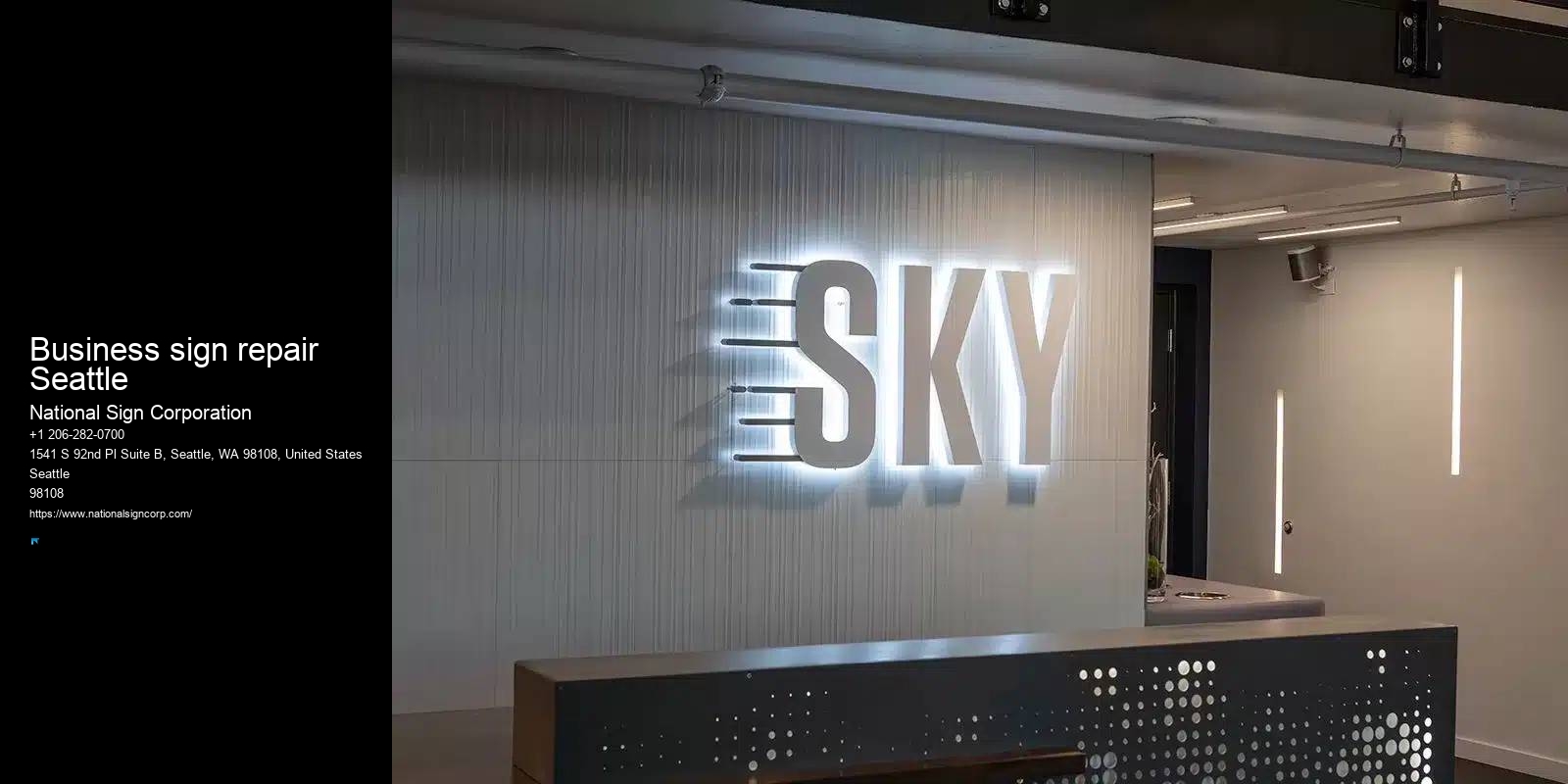
With the right sign, you're not just seen, you're remembered. Moreover, their innovative lighting solutions can cast your brand in a whole new light.
From LED lighting that consumes less energy to recycled materials that reduce waste, your choices in sign construction can serve as a testament to your brand's values. That's why it's critical to partner with a company that doesn't just set up your sign and forget about it. There's something undeniably magnetic about neon signage that draws you in, making whatever they're advertising feel instantly more appealing. You're not just choosing a sign company; you're partnering with a team of professionals dedicated to crafting custom design solutions, ensuring seamless installation, and providing meticulous maintenance and repair. You're not getting a one-size-fits-all solution.
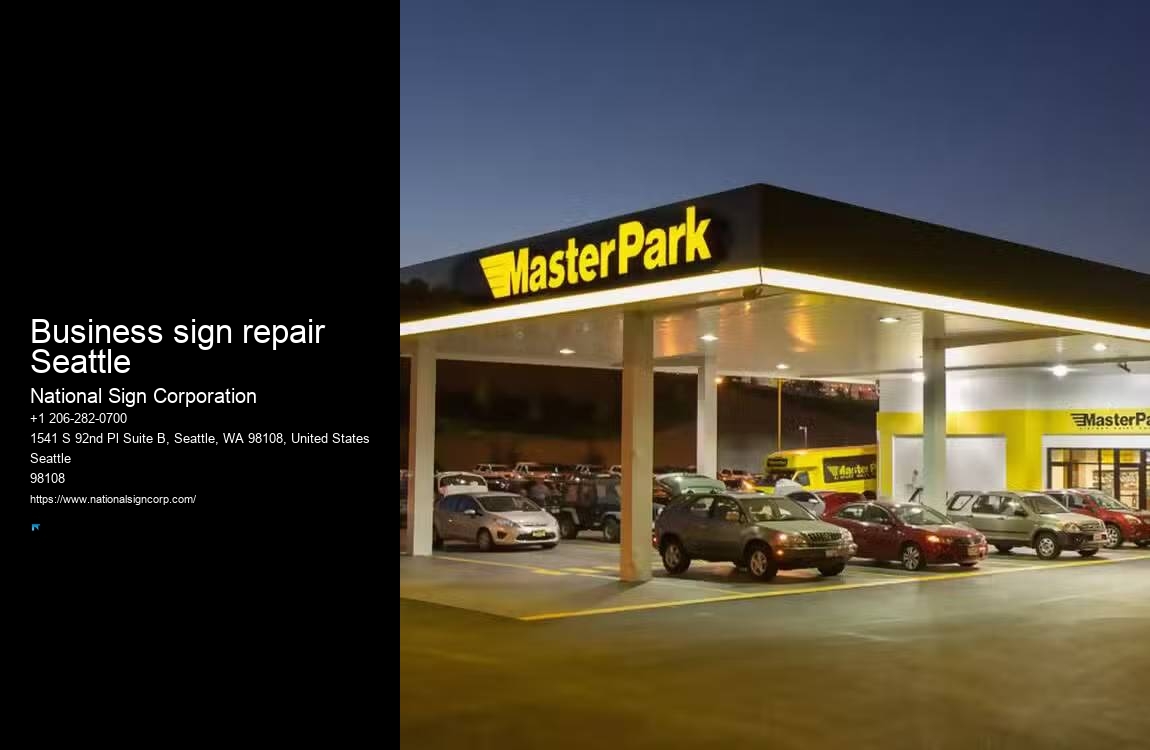



A sign is an object, quality, event, or entity whose presence or occurrence indicates the probable presence or occurrence of something else.[1] A natural sign bears a causal relation to its object—for instance, thunder is a sign of storm, or medical symptoms a sign of disease. A conventional sign signifies by agreement, as a full stop signifies the end of a sentence; similarly the words and expressions of a language, as well as bodily gestures, can be regarded as signs, expressing particular meanings. The physical objects most commonly referred to as signs (notices, road signs, etc., collectively known as signage) generally inform or instruct using written text, symbols, pictures or a combination of these.
The philosophical study of signs and symbols is called semiotics; this includes the study of semiosis, which is the way in which signs (in the semiotic sense) operate.
Semiotics, epistemology, logic, and philosophy of language are concerned about the nature of signs, what they are and how they signify.[2] The nature of signs and symbols and significations, their definition, elements, and types, is mainly established by Aristotle, Augustine, and Aquinas. According to these classic sources, significance is a relationship between two sorts of things: signs and the kinds of things they signify (intend, express or mean), where one term necessarily causes something else to come to the mind. Distinguishing natural signs and conventional signs, the traditional theory of signs (Augustine) sets the following threefold partition of things: all sorts of indications, evidences, symptoms, and physical signals, there are signs which are always signs (the entities of the mind as ideas and images, thoughts and feelings, constructs and intentions); and there are signs that have to get their signification (as linguistic entities and cultural symbols). So, while natural signs serve as the source of signification, the human mind is the agency through which signs signify naturally occurring things, such as objects, states, qualities, quantities, events, processes, or relationships. Human language and discourse, communication, philosophy, science, logic, mathematics, poetry, theology, and religion are only some of fields of human study and activity where grasping the nature of signs and symbols and patterns of signification may have a decisive value. Communication takes place without words but via the mind as a result of signs and symbols; They communicate/pass across/ messages to the human mind through their pictorial representation.


The word sign has a variety of meanings in English, including:
St. Augustine was the first man who synthesized the classical and Hellenistic theories of signs. For him a sign is a thing which is used to signify other things and to make them come to mind (De Doctrina Christiana (hereafter DDC) 1.2.2; 2.1.1). The most common signs are spoken and written words (DDC 1.2.2; 2.3.4-2.4.5). Although God cannot be fully expressible, Augustine gave emphasis to the possibility of God's communication with humans by signs in Scripture (DDC 1.6.6). Augustine endorsed and developed the classical and Hellenistic theories of signs. Among the mainstream in the theories of signs, i.e., that of Aristotle and that of Stoics, the former theory filtered into the works of Cicero (106-43 BC, De inventione rhetorica 1.30.47-48) and Quintilian (circa 35–100, Institutio Oratoria 5.9.9-10), which regarded the sign as an instrument of inference. In his commentary on Aristotle's De Interpretatione, Ammonius said, "according to the division of the philosopher Theophrastus, the relation of speech is twofold, first in regard to the audience, to which speech signifies something, and secondly in regard to the things about which the speaker intends to persuade the audience." If we match DDC with this division, the first part belongs to DDC Book IV and the second part to DDC Books I-III. Augustine, although influenced by these theories, advanced his own theological theory of signs, with whose help one can infer the mind of God from the events and words of Scripture.

Books II and III of DDC enumerate all kinds of signs and explain how to interpret them. Signs are divided into natural (naturalia) and conventional (data); the latter is divided into animal (bestiae) and human (homines); the latter is divided into non-words (cetera) and words (verba); the latter is divided into spoken words (voces) and written words (litterae); the latter is divided into unknown signs (signa ignota) and ambiguous signs (signa ambigua); both the former and the latter are divided respectively into particular signs (signa propria) and figurative signs (signa translata), among which the unknown figurative signs belong to the pagans. In addition to exegetical knowledge (Quintilian, Institutio Oratoria 1.4.1-3 and 1.8.1-21) which follows the order of reading (lectio), textual criticism (emendatio), explanation (enarratio), and judgment (iudicium), one needs to know the original language (Hebrew and Greek) and broad background information on Scripture (DDC 2.9.14-2.40.60).
Augustine's understanding of signs includes several hermeneutical presuppositions as important factors. First, the interpreter should proceed with humility, because only a humble person can grasp the truth of Scripture (DDC 2.41.62). Second, the interpreter must have a spirit of active inquiry and should not hesitate to learn and use pagan education for the purpose of leading to Christian learning, because all truth is God's truth (DDC 2.40.60-2.42.63). Third, the heart of interpreter should be founded, rooted, and built up in love which is the final goal of the entire Scriptures (DDC 2.42.63).
The sign does not function as its own goal, but its purpose lies in its role as a signification (res significans, DDC 3.9.13). God gave signs as a means to reveal himself; Christians need to exercise hermeneutical principles in order to understand that divine revelation. Even if the Scriptural text is obscure, it has meaningful benefits. For the obscure text prevents us from falling into pride, triggers our intelligence (DDC 2.6.7), tempers our faith in the history of revelation (DDC 3.8.12), and refines our mind to be suitable to the holy mysteries (DDC 4.8.22). When interpreting signs, the literal meaning should first be sought, and then the figurative meaning (DDC 3.10.14-3.23.33). Augustine suggests the hermeneutical principle that the obscure Scriptural verse is interpreted with the help of plain and simple verses, which formed the doctrine of "scriptura scripturae interpres" (Scripture is the Interpreter of Scripture) in the Reformation Era. Moreover, he introduces the seven rules of Tyconius the Donatist to interpret the obscure meaning of the Bible, which demonstrates his understanding that all truth belongs to God (DDC 3.3.42-3.37.56). In order to apply Augustine's hermeneutics of the sign appropriately in modern times, every division of theology must be involved and interdisciplinary approaches must be taken.[3]
We've worked with National on several large-scale signage projects and they're excellent. The team is creative, responsive, and the final product is beautiful. I highly recommend them.
I began doing business with National Sign back in 1989 with a relatively minor project. Their diligence and attention to detail ensured the project's success. 29 years later the two signs are still looking great and seeing them reminds me why I have chosen National to be my sole branding partner.
First off I don't like to leave reviews, but for this company I will. We are a business that has been around over 50 years looking for some bulbs to be replaced in our Honda sign. First person tells me they are way backed up which i have no problem with, and then tells me that unless i am a current customer they will not take me on, I thought businesses wanted new business, if we turned people away we would not be here, then I get transferred to a women who tells me they are 3 weeks out, no problem i say i just need them fixed, I told her the business name and she proceeds to tell me she needs address pictures of sign and a bunch of other bs stuff. I said can 't you just google us and you will see the sign and all the info she would need. She said no i can't look it up. To sum up my frustration I decided to take my business elsewhere based on this companies lazy employees not wanting to take a sec. to use the amazing tool we have called google. They are local and I wanted to support them. If I found out one of my employees had a conversation like this with a potential customer they would be fired on the spot. At the rate they are going they sure won't have a long future turning new business away. Current business always drys up and they should always be looking for new customers.
As an architect, I rely on professionals like National Sign for my projects. They are very knowledgeable, they help advise me on the very complicated codes for signage, and they are capable of integrating so many different materials: wood, metal, glass, etc... Their shop is like a workman's fantasy camp!
When you're getting a new sign, they take care of the old one responsibly. They'll recycle or properly dispose of your outdated signage, ensuring it's done eco-friendly and in compliance with local regulations.
You're wondering about the aftercare for your custom signs. National Sign Corporation offers comprehensive maintenance and repair services, ensuring your signage remains vibrant and functional long after the initial installation. They've got you covered.
Yes, you're in luck! National Sign Corporation can indeed provide signage solutions for businesses located outside of Seattle, even in different states, ensuring your branding stands out, no matter where you're based.